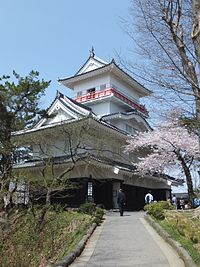Kubota Castle
| Kubota Castle 久保田城 |
|
|---|---|
| Akita, Akita Prefecture, Japan | |

Reconstructed Corner Turret of Kubota Castle
|
|
| Coordinates | Coordinates: 39°43′24.53″N 140°7′23.67″E / 39.7234806°N 140.1232417°E |
| Type | hirayama-style Japanese castle |
| Site information | |
| Owner | partly reconstructed 1989 |
| Open to the public |
yes |
| Site history | |
| Built | 1604 |
| Built by | Satake Yoshinobu |
| In use | Edo period |
| Demolished | 1880 |
Kubota Castle (久保田城? Kubota-jō) is a Japanese castle in the city Akita, Akita Prefecture, Japan. Throughout the Edo period, Kubota Castle was home to the Satake clan, daimyō of Kubota Domain, rulers of northern Dewa Province. The castle was also known as "Yadome-jō" (矢留城?) or "Kuzune-jō" (葛根城?). In the official documents of the Tokugawa shogunate, the castle was called "Akita-jō" (秋田城?), although this name is now more commonly used to refer to the Nara period fortified settlement of Akita Castle which was nearby.
Kubota Castle is a hirayama-style Japanese castle, built on a 40-metre (130 ft) hill on the left bank of the Nibetsu River (Asahi River), a tributary of the Omono River, incorporating the river and adjacent wetlands into its defenses. The main bailey was protected by a system of wet moats, earthenworks and eight yagura watchtowers; however, the castle made very little use of stone walls, which were not common in Hitachi Province, the previous homeland of the Satake clan. The castle also never had an imposing main keep, possibly to prevent attracting unwelcome suspicion from the Tokugawa shogunate.
...
Wikipedia
